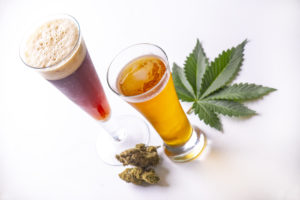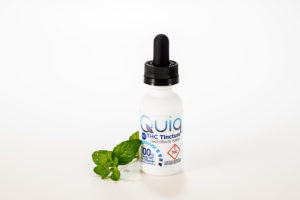New findings from cannabis research hit the press often these days, and the results typically confirm the therapeutic benefits of cannabis. Now that most states have legalized cannabis or are moving in that direction, more and more people have the freedom to choose between alcohol and cannabis consumption. There’s really not much of an argument as to which is safer, especially when consumed in large amounts, yet it’s helpful to know how these two substances compare in this regard. Read on to learn 10 ways cannabis is safer than alcohol.

10. Cannabis is prescribed to help people. Doctors are prescribing medical marijuana for its therapeutic benefits that help all sorts of ailments such as chronic pain, loss of appetite, PTSD, autism, and autoimmune disorders, to name a few. When was the last time you recall a doctor writing a prescription for vodka or a few beers? Exactly.
9. Cannabis does not increase the rate of obesity. Obesity is an epidemic in the United States. Alcohol contains empty calories and lacks any nutritional value, so it’s no surprise that research has found heavy use leads to an increase in adipose tissue, therefore to an increase in obesity.
8. Cannabis can help depression and anxiety. Alcohol is known to the central nervous system as a chemical depressant, yet many depressed and anxious people reach for alcohol to help themselves feel better in the moment. This only worsens the condition over time, potentially leading to suicide. While the overuse of cannabis can be an exacerbator, when used moderately it has been found to provide relief.
7. Beneficial effect on brain cell growth. Studies have shown that cannabis use stimulates neurogenesis, the production of new brain cells. This is the opposite effect that alcohol has on the brain and is the opposite point of view the public has been trained to think.
6. Cannabis is less addictive. Alcohol abuse and alcoholism is not just a psychological dependence, but also an actual biological addiction. Withdrawal symptoms can be lethal. There are approximately 2.1 million members worldwide in Alcoholics Anonymous, an organization that helps save many from alcohol addiction and abuse. This speaks volumes. There has yet to be any science that shows cannabis is an addictive substance.
 5. Cannabis use is not associated with aggressive behavior, violence, or violent crimes. According to a study published on domestic abuse, alcohol consumption is associated with significant increases in the daily likelihood of physical aggression, especially male-to-female aggression. The effects of alcohol abuse on human aggression and violence are concluded from statistics involving people who were at various levels of intoxication at the time of the aggressive or violent activity. Violent crimes such as murder, rape, and assaults are pervasive in individuals with excessive alcohol use that are diagnosed as alcoholics, as well as those that do not fulfill the psychiatric criteria of an alcoholic.
5. Cannabis use is not associated with aggressive behavior, violence, or violent crimes. According to a study published on domestic abuse, alcohol consumption is associated with significant increases in the daily likelihood of physical aggression, especially male-to-female aggression. The effects of alcohol abuse on human aggression and violence are concluded from statistics involving people who were at various levels of intoxication at the time of the aggressive or violent activity. Violent crimes such as murder, rape, and assaults are pervasive in individuals with excessive alcohol use that are diagnosed as alcoholics, as well as those that do not fulfill the psychiatric criteria of an alcoholic.
4. There is much less risk of injury. The harmful use of alcohol is a causal factor in more than 200 disease and injury conditions. Drinking alcohol impairs both physical and mental abilities while decreasing inhibitions. It is associated with a risk of developing health problems such as mental and behavioral disorders, including alcohol dependence, major diseases such as liver disease, some cancers and cardiovascular diseases, as well as injuries resulting from violence and traffic accidents and collisions. Sure, there are people who may drive high and cause an accident, but drunk drivers are far more common.
3. Cannabis use is not linked to cancer. Conversely, it has been shown to treat cancer and have antitumor effects. What about lung cancer, you ask? Researchers have yet to prove either way if cannabis causes lung cancer. Any smoke that is inhaled contains toxins and other carcinogens. Carcinogens are substances that are known to cause cancer, and these substances are produced whenever something burns. So, when it comes to smoking cannabis, the potential for lung damage does exist. Alcohol, on the other hand, increases the risk of developing cancer.
 2. There is no risk of lethal overdose. As with any substance, you can absolutely overdo it, but death from a high dose of cannabis isn’t possible as it is with alcohol and many other substances. There haven’t been any reported deaths resulting solely from cannabis use. The primary psychoactive compound of the cannabis plant, THC, has an extremely low toxicity, posing no threat of death. It’s important to note that cannabinoids and other molecules in cannabis can affect the metabolism of pharmaceutical drugs, which can lead to drug toxicities by these medications within the body. Here’s a list of medications that are known to interact with cannabis.
2. There is no risk of lethal overdose. As with any substance, you can absolutely overdo it, but death from a high dose of cannabis isn’t possible as it is with alcohol and many other substances. There haven’t been any reported deaths resulting solely from cannabis use. The primary psychoactive compound of the cannabis plant, THC, has an extremely low toxicity, posing no threat of death. It’s important to note that cannabinoids and other molecules in cannabis can affect the metabolism of pharmaceutical drugs, which can lead to drug toxicities by these medications within the body. Here’s a list of medications that are known to interact with cannabis.
1. Death toll from cannabis is zero. Death toll is one of the biggest tell-tale indicators of danger. According to the WHO, there are 3 million alcohol-related deaths annually worldwide, this is 5.3% of ALL deaths. Not only that, let’s look at binge drinking and college students. Recent statistics from the National Institute on Alcohol Abuse and Alcoholism (NIAAA) indicate that each year drinking by college students contributes to an estimated 1,519 student deaths, 696,000 assaults by students who had been drinking, and 97,000 cases of sexual assault and date rape.
As you can see, cannabis is far less harmful than alcohol, plus it contains a range of beneficial properties. Any intoxicant carries with it the potential to be abused and the old adage, everything in moderation, is just as relevant here. For most people, modest use of cannabis or alcohol are both pretty safe. Yet overall, history, data, and subjective experience supports cannabis as the safer of the two. Do yourself a favor: to protect your liver and your lungs, consider edibles the next time you’re shopping at a dispensary.
